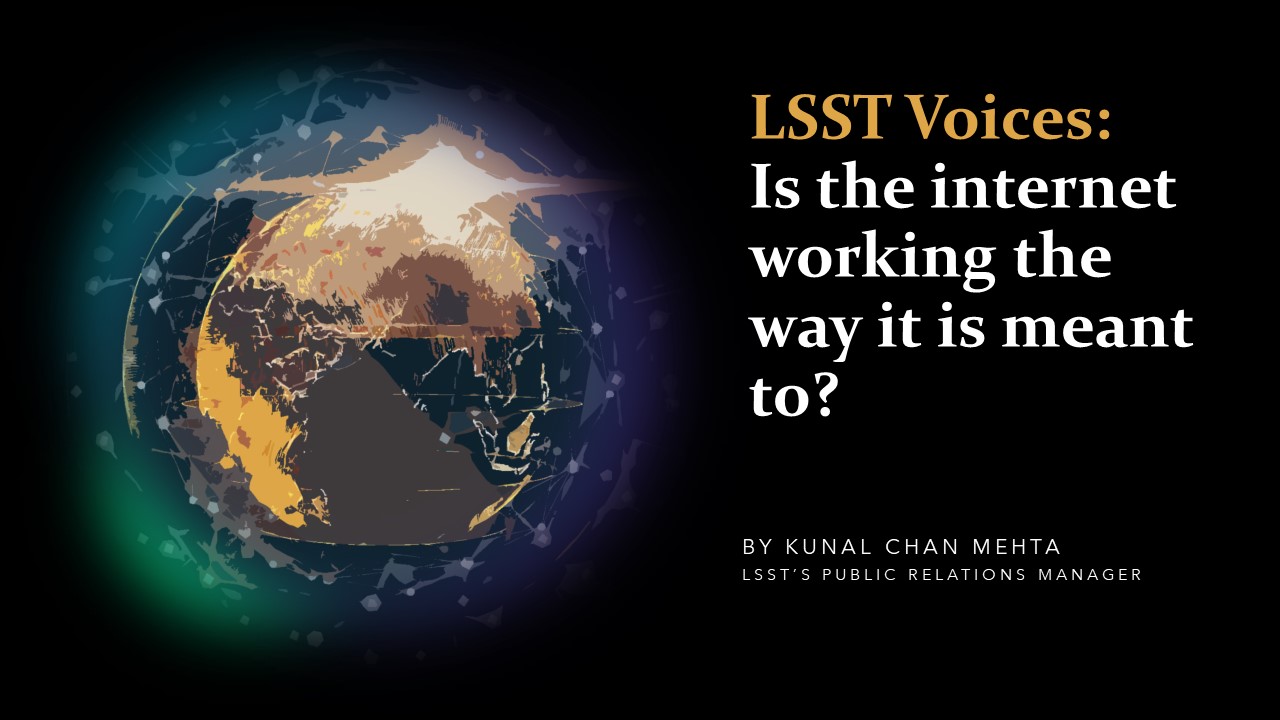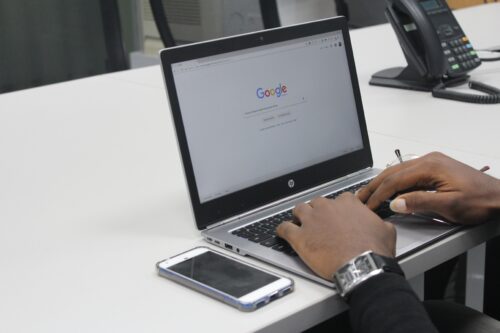LSST Voices: Is the internet working the way it is meant to?
By Kunal Chan Mehta | Article Date: 27 October 2022
The original purpose of the internet is knowledge sharing but LSST experts claim this is at the expense of those sharing it.

.
The internet is one of the most important innovations of all time. But something is wrong – very wrong – when Tim Berners-Lee, the founding father of the internet – or whatever it has become today – says: ‘What was once a rich selection of blogs and websites has been compressed under the powerful weight of a few dominant platforms making it possible to weaponise the web at scale.’ Such stark observations question what the internet is evolving into. We assemble expert LSST voices to delve deeper into the ‘broken internet’.
The internet reflects the world – its highs and lows – and is a complex global mesh that has completely reinvented the way we connect, communicate, create, contribute, consume – and, more recently, cancel. The increasing ease of internet access has predominantly crafted a continuously connected ‘online world’. But do we need to be? And why are we all so internet-reliant?
The internet we have today may not be the one we like – but it sure is the one we deserve. Over the last several decades, we created it and revealed everything to it. We shook hands with internet giants when we used their platforms without charge. In turn, they presented us with targeted adverts, collected our information and, subsequently, gained considerable power and control.
‘Despite its many advantages, the internet needs to create a better and fairer future and act as a democratic tool to champion legitimacy,’ states Irina Barariu, LSST’s Student Union President, who investigated the British Government’s digital estate. ‘Our shared online environment needs to be more helpful – not harmful – and embrace more inclusivity – not exclusivity.’
Indeed technology must serve humanity – not the other way around. The internet was always purposed to be open and accessible to everyone. However, the relatively youthful internet (est 1991) has migrated from a simple network of information (Web1) to a network of people or social media (Web2) to a complex network of things/computing devices (Web3). Staggeringly, as we still grapple with the issues of Web1, we fast sail into the unknown and undefined Web4 – perhaps the Internet of People (IoP) – especially as Facebook (now Meta), Google, Apple, Microsoft and Amazon compete for possession of the next internet stage.

.
A better internet
The web has long battled to be a safe and empowering environment. Yet, in our wait to combat this, we have allowed the internet landscape to shift underneath us. ‘The Internet of Things (IoT) is becoming the Internet of Threats,’ states Lynnette Douglas, LSST Aston’s Senior Welfare, Disability & Student Support Co-ordinator, probing the internet’s soaring control and power. ‘Whilst it is commonplace to live online there are many unanswered questions about domination, access, privacy and security.’ Advocating an IoT detox, Amine Lallali, LSST’s IT Manager, says: ‘I genuinely believe everyone should at least once visit a secluded spot – such as a desert – and be free from the internet for a month. Hopefully, this will allow people to realise that the digital environment is subordinate to reality.’
‘It is about balance. We need to make sure the internet does not completely take over our lives,’ notes Chompa Rahman, a LSST Luton Business student – and an award-winning writer on how the pandemic has changed the world. When asked about the pandemic switching the world to an online-everything, Chompa replied: ‘The pandemic has fast accelerated our evolution into a digital, online and mobile society that is everyone’s necessity. It is an ingrained part of our culture and, worryingly, life is unimaginable without it. But we must seek ways to replace any over-reliance on the internet.’
‘Paradoxically, the pandemic migrated much of the social and business world online and the internet proved to be a lifeline allowing us to carry on virtually when we could not physically,’ added Samia Zaheer, a Business Management student at LSST’s Luton campus. ‘And that is something to be thankful for. But, in our pandemic isolation, we all spent a large amount of time in front of a screen and many of us have become accustomed to this without realising it.’
Even before the pandemic further normalised the virtual sphere, the internet had already reshaped much of the human world and allowed historical changes and advancements. Speaking about the prospects ahead, Mr Ali Jafar Zaidi, LSST’s Deputy CEO, said: ‘As with any transformation, there will be challenges. Nevertheless, as we are still repairing, rebuilding and reinventing there has appeared an opportunity to create better.’ ‘Yes, the pandemic catalysed change – but it is up to the best of humanity to shape a better online world by speaking up,’ agreed Mohammad Haider, Dean of LSST’s Wembley campus, discussing the internet’s lost trajectory. ‘We must not fail in utilising this moment to stand up for privacy, access and data concerns. We may never get such an opportunity again.’
Dr Sisi Wang, a Senior Lecturer in Business and Course Coordinator at LSST’s Luton campus, affirms in ‘moving away from inertia’ and for ‘standardisation and coherency’ across user interfaces and governments. Wang added: ‘Only through cooperation and governance can users, developers, leaders and changemakers overcome web3-era issues and move towards a better web-phase’.
.
Rewriting the narrative
As we move towards a world where the physical and digital concomitantly blend, additional regulations and conventions are needed to give people more control of their digital identities, ownership and – above all – what is happening to the data they create. Shan Wikoon, a reader in 3D printing technology and a Senior Lecturer in Business and Module Leader at LSST’s Elephant and Castle campus, asserts: ‘The internet is here to stay and it is up to us to make sure it stays in the right hands. Frankly, with every solution, there is a problem. This is intensified in the tech universe. For example, one moment 3D printing champions innovation and environmentally friendly solutions; the next, it is used to make weapons.’
‘My biggest concern is who is policing the web. No one is really governing the internet. Overall, throughout Big Tech, it is a profit before people approach,’ espouses Imran Termezy, LSST’s Data and VLE Officer, expressing concern for the lack of internet jurisprudence. When asked about a possible solution, Imran replied: ‘Increasing regulatory powers to safeguard user data and enhancing access control systems.’
.
Trust and scandals
The internet – or Berners-Lee’s version of it – started well and once represented liberation. Today it could even come across as a tool of tyranny. ‘I don’t trust much of what I see online these days. The lines of what is real and fictional are heavily blurred,’ posited Mircea Radu, a Business Management student at LSST’s Luton campus, discussing the humble origins of the internet.
‘The use of the internet seemed like a fair transaction to start with,’ asserted Samia Zaheer, a Business Management student at LSST’s Luton campus. ‘But over time the internet user has become exploited in a very sophisticated way. There is an urgent need to resolve this crisis.’
‘The Cambridge Analytica scandal and its dire consequences tell me everything I need to know about social media practices and the internet. Already the NFT, blockchain and cyber currency landscapes are nefarious and we need alternatives to unregulated practices,’ adds Mohammed Miah, a Business Management student at LSST’s Luton campus.
In contrast, concerning online privacy, some progress was made in 2018 – but there is still a long way to go. The General Data Protection Regulation (GDPR), introduced by the EU, aimed to enshrine privacy as a right. Unfortunately, it overlooked how it would manage organisations dealing with personal data. ‘GDPR was not a one size fits all approach, but it had some strong consequences for social media giants,’ commented Mohsin Riaz, Dean of LSST Birmingham.
Since data-sharing practices have become a peak priority for technology companies – as well as their consumers – legislators have also refined their attention on the use of data. ‘Although Big Tech companies have taken good governance steps, it is worth remembering if you aren't paying for the product, then you are the product,’ says Farwa Amin, a Lecturer in Health and Social Sciences at LSST’s Elephant and Castle campus. Syed Rizvi, Associate Dean of LSST’s Elephant and Castle campus and LSST’s Dean of Teaching and Learning, added: ‘This conversation is long overdue. Big Tech – or Big Brother – is fast buying up the future of the internet and gaining a larger percentage of your life. We have explicitly and happily let this happen.’
.
The future internet
We are seeing our digital identity ingrained into the physical world as the internet further encapsulates our lives as a utility that we expect to be available and always around us. Throughout the internet-verse, some things may move quickly and others will take time. Although the journey ahead appears long-sighted, it is now time to commit to delivering the internet we want, in a world we want and for the generations ahead.
Could we change the broken internet to restore and build back trusted relationships – the benchmark of healthy democracies and economies? From the outset, our aforesaid LSST Voices agreed that addressing the internet’s position and power is one of the most deeply rooted problems of our time and would necessitate far more caution before we enter the next phase of the internet.
We need a bold new internet, built by a global cooperative of distinct, strategic thinkers – and creators. We need to discover a path to embed democratic values back into the core of the internet’s realm to protect the future generations who will, in due course, use it – and depend on it. And most importantly, we need to revert to Berners-Lee’s original internet model – and that is what will give users back control of their data.
LSST and LSST’s Student Union will soon run a series of online webinars and debate sessions (register via kunal.mehta@lsst.ac):
Debate 1: In the wake of Web3 and Web4, should we be hopeful—or fearful— for our changing digital and online environments?
Debate 2: Do we really need to be constantly connected to the internet to live in the real world?
.
Further reading
LSST students ask Bosch how technology will make the world a better place
'The web is under threat': Tim Berners-Lee on making the web work for everyone | British Council
Google’s Sundar Pichai: Privacy Should Not Be a Luxury Good
Facebook: A Privacy-Focused Vision for Social Networking
Microsoft: Privacy -It’s all about you
Please email the author of this article via kunal.mehta@lsst.ac for any questions or comments - or if you would like to take part in future such articles.
The views expressed are those of the author and contributors and not necessarily those of LSST.
LSST is not responsible for content on linked and external sites.
Sharing is caring!





The Internet has revolutionised industries, education, governance, and healthcare systems and has become an essential communication instrument we employ to interact with each other.
Internet is today ingrained in every facet of our lives, at the individual level and throughout the configuration of the entire society.
The development of the Internet has triggered new challenges to privacy and security, and it has become one of the critical drivers of social evolution. Tremendous quantities of data is uploaded and downloaded 24 hours a day, including vulnerable personal data. Hence, awareness and user education is critical for this new environment; everyone’s privacy and safety must be a fundamental requirement and treated as a universal value.